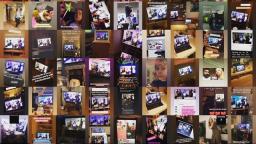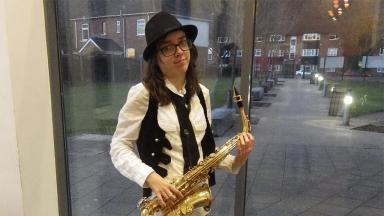
This article was written by Charlotte Dale, Youth Music Next Gen
Back in January I, along with many university students, was preparing for the final six months of my degree and what would soon be graduate life. Things were looking bright. I was on track to achieve a First-Class degree in Music Business from the University of Gloucestershire, I had secured a summer internship with Disney and I had ambitious plans to relocate in the hopes of securing my dream role working on promotional campaigns for popular music artists at a record label. And then the coronavirus pandemic hit.
My post-graduate summer work experience was cancelled. I was no longer moving to Florida to work as a costume assistant for Disney entertainment, learning about operations and live shows. The stark reality was that I faced, instead, a sudden move back to my childhood home in March, to sit for six months with absolutely nothing to do. That experience had been crucial to my plan to kickstart my career. How was I going to get a job now?
For months now the live music industry has been on pause. Highlighted by campaigns like #WeMakeEvents, record labels deserted their offices to work from home and music production was restricted to a small number of skilled studio techs. This has left very little room for graduate recruitment, interns, or even short-term work experience opportunities and made the few roles that were available extremely competitive. Amidst all the chaos, uncertainty and change, the struggles of recent graduates have been lost, particularly for those in the arts sector. It was tough seeing peers in other industries progressing straight into full-time jobs, leaving me behind confused and uncertain of what to do next.
I think it’s important that at such a time, we remember that we’re not going through this alone. I asked other music graduates to find out how they’ve been coping, and what comes next.

"Post-graduation, all graduate schemes presented to me at events firms were cancelled and not scheduled for a return date. All events firms sadly seemed to dwindle in numbers due to the pandemic, and so returning to do postgraduate study and a retail-based job were the next steps for me. Industry contacts have stated how dire the situation is regarding employment, and so it looks unlikely a job in the live events sector is going to be on the cards anytime soon.” said Megan Erskine, a Popular Music Graduate/ Events Management student at University of Derby.
Adam Thorn, a singer-songwriter and popular music graduate at University of Gloucestershire shared how the pandemic also affected his plans.
"I can think of nothing else that has personally affected me and my music career as much as the pandemic. I had always planned to complete my degree and immediately move to an area with a thriving music scene, in which I could play as many gigs as possible in an effort to instigate a career as a professional musician.
“Music venues and festivals have been hit hard, with only a small minority of premises able to host events conforming to the strict guidelines set out by the government to enable effective social distancing. The upshot of this is that I haven’t been able to move away from the rural part of Wales that I call home, nor have I been able to perform live for almost an entire year. Live performance helps me develop, both musically and professionally. Without the freedom to play gigs, I feel as if I am not utilising my skills, let alone sharpening them.
“However, I am doing all I can to remain positive and to maintain my engagement in music. When circumstances allow, I hope to hit the ground running and seize every gig opportunity that I possibly can. Until then I will continue practicing at home and irritating my mum by serenading her while she conducts very important Zoom calls for her very important job.”
Ellie Almond, a University of Sheffield graduate eager to work in music supervision, shared, “As an industry that relies so heavily on face-to-face interaction and ‘who you know’ in order to hear about opportunities, this digital transition has made it very difficult for graduates to enter the industry. Right now, due to job losses, there are too many people with years of experience applying for the same jobs as graduates, giving grads very little chance of being successful.”

However, whilst graduate employment may be more difficult, we have seen graduates taking matters into their own hands more than ever. At the beginning of the lockdown, masses of virtual events popped up across the internet, with musicians taking part in live-streamed concerts, festivals and industry events.
Freelancing has also been a great and flexible option allowing recent graduates to juggle alternative employment and developing their music career. Some even developed their own music magazines and blogs such as Carla Kerslake, a recent Music Business graduate and aspiring music manager who runs Are We There Yet.
“When I finished my degree in a lockdown, I decided that I wasn’t going to sit back - especially as I knew the music industry job market was going to be incredibly tough. I wanted to start a project that was going to help me but also, I would love doing! I felt it was important to use this time as an opportunity, so I created a music website called ‘Are we there yet?’ (AWTY) which has an emphasis on women in music, a topic I am especially passionate about and researched for my dissertation, but also a focus on music locally to me. It has been fantastic in helping me keep and make new contacts whilst I can’t network at events. It’s also lovely to be able to talk to people in the music industry about what they love, especially while they are unable to do it. It’s actually been really inspiring and really enabled me to keep developing new skills.”
There is hope for the music industry yet, and it is just a matter of time before each and every one of us finds our part in it. As you continue your employment search be sure to check out music jobs boards from Youth Music, Creative Access and The Dots, and you will be surprised by the number of different projects available that span across the country, whether that be in a paid role, a freelance role or simply as a volunteer. Similarly, recruitment agencies such as Handle Recruitment and The Music Market have great industry connections and can provide you a helping hand in finding a role with the industry to suit you.
Whilst there isn’t a quick answer or easy path to finding employment, it remains important to continue working towards your career and networking during the wait.
Benjamin Kelly, an aspiring producer and Creative Music Technology Graduate offered some words of wisdom about how to make the most use of out your time.
“It definitely isn’t the easiest thing being a music grad during this difficult period. I wish to work in a music studio full time and there just aren’t many opportunities appearing. That being said, it is best to use this time to build your brand, whether you’re a musician or a businessman/woman and start applying for online/remote work. This has certainly kept me occupied these past few months and it’s simply better than just doing nothing.”
Whilst it may be difficult, we must focus on the future and remember that this is only temporary. I certainly haven’t been put off about pursuing a career in the music industry. I know if I entered another profession, I would always regret not trying to do what I love. So, whether it be lockdown livestreams, developing new music magazines, or trying our hand at freelancing, there are options and support available to ensure we are proactive and put our graduate skills into practice.
To finish I thought it was important to hear from somebody within the industry; Charlotte Tindle, is a Talent Acquisition Co-ordinator at Sony Music and in a great position to give both an overview of the employment landscape and provide us with a glimmer of hope.
“Times are turbulent at the moment and nobody really knows what is going on, but the music industry isn't going anywhere. Streaming is through the roof and major labels are doing as well as ever. Take this time to work on yourself, your skills and really think about where you want to be when this madness is over. Don't waste it, make the most of being able to step away from it all. It will get back to normal, or it might even get better, with more accessibility for people to work remotely. Give it time, keep going!”




